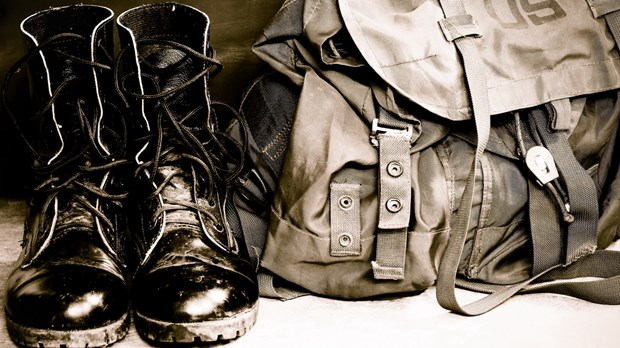When Your Child Serves Overseas

Seasons came and went while I waited: a five-minute satellite call at Thanksgiving but silence at Christmas. A missed call and voicemail in January but the passing of spring without a word. A six-word message in summer: “Hi, hope you’re okay. I’m alive.”
In the early years of Operation Enduring Freedom (2001–2014) and Operation Iraqi Freedom (2003–2011), my fears ebbed and flowed with the frequency of my son’s communications. The protective secrecy surrounding his deployments left much to my imagination. In the gaps between conversations, my worry intensified.
During these silent times, my imagination entertained my fear. I disguised my anxiety with cavalier bravery, pretending my trust in God was enough to carry me. I spoke courageously about my faith in his training. I retold stories about his commitment and dedication. I shared tales about the units in which he served. I even laughed at my lack of information, using my ignorance as fodder for the occasional lunchroom joke. But truthfully, the thoughts of my son turned over in my mind ad nauseam.
While my friends, family, and coworkers always asked after my son, this only fed my anxiety. I had three other children (my second son, still in high school, had not yet joined the military), but all I could do was talk about the son who was away. I felt ashamed of my thoughtlessness toward my husband and other children—they deserved my attention and prayers—but I couldn’t stop the conversation that camouflaged my obsession. I was trapped in a cycle of fear-filled waiting that I could not break.
Now, for more than a decade, I’ve been working through the emotional and spiritual challenges of having sons in combat. “No news is good news,” my eldest and most experienced soldier tells me, but I often hope for any news. “If something bad happens, you’ll be notified within 24 hours,” he reminds me.
But I take no comfort in the absence of a notification or in the silence that stretches through each deployment. No news is not good news when I’m left alone with my vivid imagination, worries, and fears. When lives hang in balance, even my best prayerful efforts feel anemic against the inventions of my mind.
The Cycle of Waiting and Worrying
For some, stress created from fear is occasional and short-lived. It’s confined to life’s big, out-of-control moments such as the delayed biopsy result when a suspicious lump is found, rumors of layoffs following poor third-quarter results, or an overdue phone call as a teenager’s curfew expires.
This anxiety can also be a source of self-preservation. Experiencing fear—the foundation of our protective fight or flight response—can be the natural stressor that drives us to action and protects us from danger. It’s a response reserved for humans alone. Worry allows us to focus our protective instincts on perceived threats, says Dr. Jim Taylor, contributing writer to Psychology Today.
But worry can also quickly move to an unhealthy response. “When it goes beyond concern and reasonable motivation to protect yourself,” Taylor adds, “it involves negative and obsessive thinking, doubt, physical anxiety, and fear.” Amy Simpson, author of Anxious: Choosing Faith in a World of Worry, seconds this concern, noting that worry is “the practice of indulging fear, clinging to it, feeding and serving it.”
When the stakes are high, we often feed our fear in proportion to our feelings of helplessness. Our fear drives us to do something, but our inability to resolve the conflict creates the circumstances through which we replace productivity with worry. In the vacuum of waiting, worry can replace the very air we breathe. We fabricate future events, anticipating outcomes proportionate only to our hyperactive imaginations.
“God calls us to live in the present and gives us what we need to live in his strength,” Simpson writes. “Worrying about the future means we at least partially ignore the gift of today and the calling we have to be in the place we are, with the people around us.”
Strength in the Waiting
In the Old Testament, the art of waiting, not worrying, is a practiced skill. In nearly every book of the Old Testament, there’s at least one story that demonstrates how we should or shouldn’t wait, and I’ve taken these accounts to heart as I learn to wait without fear.
In Genesis 16, when Sarah attempted to fulfill God’s promise of a son by having Abraham conceive with her servant, she demonstrated her doubt in God’s ability to fulfill his promise. Her solution to shortcut her waiting caused hardship and heartache. By obsessing and worrying about my son, I too was seeking a shortcut to end my waiting. I worried about the future, imagining a world where God is nearly or completely absent. It never occurred to me that God did not need my human-sized solution for his God-sized problem.
Waiting in the dessert with the Israelites, Moses missed his opportunity to enter the Promised Land because he acted in deference to the Lord’s instruction by using his own strength. The Lord only required an utterance before the Israelites to bring water from a stone. Instead, Moses acted in outrage against the whining masses, pounding his staff to demonstrate his own power above the Lord’s. Muscling his way through a difficult situation, he filled the gap between God’s truth and his own imagination to manufacture a solution.
God’s promises for strength and courage begin when we stop inventing solutions for our fear. God gives us strength in the waiting when we confess the end of our own. And God gives us a reason undergirding that strength: “Be strong and courageous. Do not be terrified; do not be discouraged, for the LORD your God will be with you wherever you go” (Joshua 1:9, NIV, emphasis added).
God’s chosen people failed, and succeeded, at waiting. They filled their waiting with worry, whining, anxiety, and anger, taking control of their circumstances to create manmade solutions. But this is not how God chooses for us to wait. God wants us to wait with strength, courage, patience, and hope.
Surrendering Fear to the Lord
My surrender to the Lord began when I recognized the absolute end of myself. I confessed my obsession and worry and stopped pursuing my own strength and courage. Admitting my deepest fear—the loss of my sons—was the crossing of the Jordan and a pathway to God’s promise of rest from the worries that enslaved me.
Knowing the boundary between the actions that preserve our protective instincts and the obsessive worry that defeats our faith is not always an obvious battle line, but with prayer, patience, and practice, the contrast between our healthy and unhealthy responses diminish.
Today, the communication from my sons comes with their boots firmly planted in American soil, but I know this blessing is temporary. God never promised an end to conflict in this world. What he did promise was an end to my fear and a refuge we can only find in him.
Mary E. Goodrich is a writer, wife and mother of four adult children. With a deep family history of alcoholism, she brings decades of experience to her recovery-focused articles. Visit her at MaryEGoodrich.com where she blogs about family, marriage, work, purpose and wellness.
Read more articles that highlight writing by Christian women at ChristianityToday.com/Women
 Read These Next
Read These Next
 A Severe Case Of "Affluenza"Are your kids fighting the gimmes? Here's how to help.
A Severe Case Of "Affluenza"Are your kids fighting the gimmes? Here's how to help.
 You Are Worth Fighting ForFor when you feel too fat, too frumpy, too stupid, or too poor
You Are Worth Fighting ForFor when you feel too fat, too frumpy, too stupid, or too poor








 Homepage
Homepage